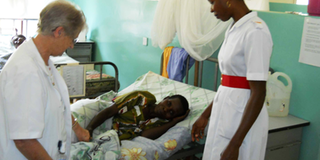Prime
Tackling the fistula problem in rural areas

Dr Maura Lynch (left) attends to a fistula patient at Kitovu Hospital in Masaka Town and, right, is Paula Birungi a nursing officer and an obstetric fistula counselor. PHOTO BY MICHAEL J. SSALI.
Medical people describe fistula as an injury that occurs during child birth when a woman is in labour for too long or when the delivery is obstructed in some way. The injury involves the destruction of the tissues in the woman’s private parts and results in uncontrolled passing of urine or faeces or both.
She develops a permanent foul smell and becomes very difficult to live with. Such women normally lose their employment and get abandoned by their spouses and relatives. In most cases the women also lose the baby which worsens their misery. This is mostly a result of lack of access to antenatal care in a health facility.
In many cases it is due to failure to get to hospital in good time because of transport difficulties. “If we work on fistula repair cases at the present rate it will take over 100 years to deal with all the cases in Uganda, assuming that no new cases come up from today onwards,” said Dr Jacinto Amandua, Commissioner Clinical Services, Ministry of Health, who attended the brief ceremony to mark the end of a two-week fistula repair camp at Kitovu Hospital, in Masaka Town on December 3, 2010.
He went on to reveal that Uganda has an estimated 250,000 cases of unrepaired fistula. The victims live in solitude far away in rural areas, too poor to seek medical help and also too unclean to travel by public means to where they could get help.
The problem is we don’t have enough doctors trained in fistula repair. We lack well stocked surgical theatres. Our women lack awareness about the importance of attending antenatal clinics. We don’t have well staffed and well equipped health facilities to handle child delivery emergencies. Most households have no money saved up to use in case of an emergency during a woman’s child delivery. Many girls get married too young, before their bodies are ready for the rigors of child birth.
Our people still have a lot of faith in traditional birth attendants. Often when a doctor tells a pregnant woman that she has an abnormality and she should deliver in a hospital where caesarian operation is possible she attributes the abnormality to witchcraft and chooses to visit traditional healers instead going by the doctor’s advice. Most of the women interviewed at Kitovu testified to nearly all the scenarios.
49 surgical cases of fistula repair were carried out in the camp at Kitovu. Dr Michael Bishop, a volunteer from Britain, and a consultant surgeon, Dr Maura Lynch and an Irish Catholic nun resident at Kitovu, have for the last few years been presiding over such camps in which close to 1,500 fistula cases have successfully been repaired.
Kitovu Hospital has carried out fistula repair since 1987 when Dr Maura arrived there. The surgical operation was then rather expensive until 2004 when the hospital got funding from organisations such as Engender Health and was able to provide free fistula repair. Since then, Dr Michael Bishop, has been regularly coming to Kitovu where together with Dr Lynch they have held fistula repair camps and trained local doctors to carry out the rather complicated operation.
Today, Uganda has about 39 doctors that have attended the training at Kitovu, spread out in the different hospitals in the country, including Virika, Mbarara, Kagando, Mulago, Bwera, Kasese, Mbale, Kumi and Lira.
At Kitovu training fistula repair is provided not only to the doctor but also to the theatre nurse, and the fistula ward attendant. A surgical fistula repair operation renders the woman clean and she may even produce children again. However there are too many cases for the medical help that is available.
Minister of State for Health, James Kakooza, who was chief guest at Kitovu said the government of Uganda has allocated $120m to maternal health care and that with a lot more money expected from the recently discovered oil in the country fistula will become history in the not so distant future.




